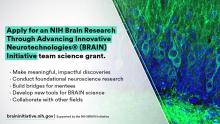
The next application deadline for the BRAIN Initiative: Team-Research BRAIN Circuit Programs – Team BCP is Friday, September 16, 2022.
In support of the BRAIN Initiative’s goal of a mechanistic understanding of behavior, the NIH offers a family of funding opportunities focused on “Integrated and Quantitative Approaches to Understanding Circuits.” These opportunities share an overall goal of investigating behavior in terms of dynamic circuits. This set of funding opportunities is designed to allow for tackling scientific questions at different scales and at various complexities, and to balance support for individual lab science and team science approaches.
Two recently reissued notices of funding opportunities (NOFOs) are the Team-Research BRAIN Circuit Programs: BRAIN Initiative: Team-Research BRAIN Circuit Programs – TeamBCP (U19 Basic Experimental Studies with Humans Required) [RFA-NS-22-039] and BRAIN Initiative: Team-Research BRAIN Circuit Programs – Team BCP (U19 Clinical Trial Not Allowed) [RFA-NS-22-040]. These NOFOs will support research programs in a team science approach with a multi-Principal Investigator (PI) structure; and 3-5 research projects focused on a high-impact topic and cutting-edge technologies in large-scale recording and manipulation of circuits in vivo in the context of measurable behaviors. The scope of work should include multiple disciplines, approaches, scales, species, etc. that require necessary synergies to be fully successful.
What do I need to know to apply?
Applications are expected to:
-
Focus on overarching principles of circuit function in the context of specific neural systems underlying sensation, perception, emotion, motivation, cognition, decision-making, motor control, communication, or homeostasis.
-
Understand these circuits of the central nervous system by systematically controlling stimuli and/or behavior while actively recording and/or manipulating relevant dynamic patterns of neural activity and by measuring the resulting behaviors and/or perceptions.
-
Employ approaches and experimental design guided by specified theoretical constructs, and are encouraged to employ quantitative, mechanistic, and predictive models where appropriate. Model systems, including the possibility of multiple species ranging from invertebrates to humans, can be employed and should be appropriately justified.
-
Employ multi-component teams of research expertise—including neurobiologists, statisticians, physicists, mathematicians, engineers, computer scientists, and data scientists, as appropriate—that seek to cross boundaries of interdisciplinary collaboration.
-
Manage their data and analysis methods in a framework that will be developed and used in the proposed U19 program and exchanged with other U19 awardees for further refinement and development.
Additionally, applications submitted to this reissue require a Plan for Enhancing Diverse Perspectives (PEDP). Applications without this new component will be withdrawn prior to review. The team’s PEDP will be evaluated during peer review as part of scorable criteria and used to inform funding decisions. More information on the PEDP can be found here.
If you are proposing a human research component, please apply to RFA-NS-22-039. This NOFO will accept basic experimental studies in which human participants are prospectively assigned to experimental conditions and receive an intervention or experimental manipulation where the effect will be assessed for the purpose of understanding fundamental aspects of phenomena. Human studies with invasive (intra-cortical) recording and/or stimulation must include neuroethical considerations, such as consent of patients recruited into studies with the possibility of risk beyond therapeutic standards of care without expectation of personal therapeutic benefit. Additional risks should be identified and justified as minor and manageable. Consent methodology should avoid patient coercion or therapeutic misconception.
The next application deadline for NS-22-039/40 is September 16, 2022. For more information, please visit the NOFOs (RFA-NS-22-039 and RFA-NS-22-040) or contact BRAINCircuits@nih.gov.
